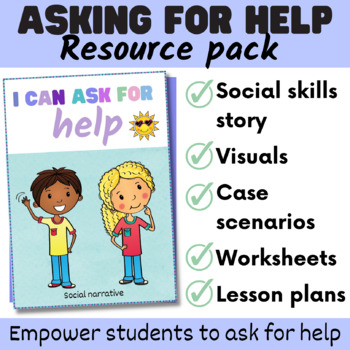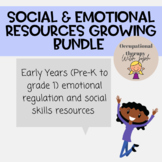Asking for help - social skills story, case scenarios, activities and more!
What educators are saying
Also included in
- Social & Emotional learning resources for early years (Pre K to grade 1) and specialist education. These emotional regulation resources are designed to support students to increase their emotional vocabulary, ability to identify emotions, verbal and non verbal cues, social skills (such as askinPrice $69.76Original Price $87.20Save $17.44
Description
This SEL activity “asking for help” pack contains everything you need to teach the important social skill of asking for help. It includes a social narrative, worksheets, help visuals and tokens, student self-rating tool, case scenario cards, comic book strip activities, help seeking dice activity and lesson ideas.
Why is it important?
Often students can become frustrated, disengaged, and avoid difficult or new tasks. Asking for help is a fundamental social skill for both children and adults. Children will experience challenges as they grow and develop throughout their lives. The ability to know when, how and who to seek help from supports a child's social and emotional wellbeing and development. Studies have shown children who can seek help are more likely to have greater social and emotional wellbeing.
Why your kiddos will love it?
This SEL resource is visual, simple and fun - to suit a range of learners. Your kids won’t even realise they are learning. It is sure to be a staple in your teaching toolbox.
What’s included?
Social narrative (7 pages) in pdf and PowerPoint
This social narrative teaches students it’s okay to ask for help, everyone needs help sometimes and how to ask for help at school. Story briefly covers:
- It’s okay to ask for help
- Everyone needs help sometimes
- When you might need to ask for help
- Who to ask for help (teachers, parents, friends, siblings or family)
- How to ask for help
Three lesson plans (3 pages) in pdf
Three potential lesson plans are also provided with ideas on how to use included activities and prompts to think about when delivering help seeking lessons / sessions.
Help visuals (1 page) in pdf
These help visuals can be used as table cards for students or as a token card to communicate how students are going with their work. For some students it may be difficult to use their words to communicate they need help. This extra support can let you know if they need help. It includes a visual for ‘help’ and ‘I’m okay’.
Student self-rating tool (1 page) in pdf
Have your client / student rate their own skills at asking for help. Use to support:
- Student’s reflection
- Develop goals
- Have student re-complete self-rating tool after you’ve worked with them to increase their self-help skills and show them the progress they have made.
The rating tool uses a three point Likert scale and covers:
- Ability to ask for help
- Knowledge of different ways to seek help
- Who to ask for help
- How they feel about asking for help (e.g. is it tricky, difficulty, easy, etc.)
Asking for help workbook (6 pages) in pdf
SEL activity worksheets ask students to draw a picture of something they need help, something they can help others with and who they can ask for help. Next it asks students to identify possible people they might ask for help in different situations (using multiple choice with visuals). The final activity asks students to reflect on situations they might need help and situations when they are okay.
Asking for help dice: (1 page) in pdf
This dice can be a fun warm up or cool down activity. Students can roll the dice and complete different challenges related to asking for help. A fun way to re-enforce all their hard work!
Comic strip book activities (7 pages) in pdf
Comic book strips are an engaging medium to teach students that it is okay to ask for help as well as how, when and who they can ask. This SEL activity also encourages students to reflect how they might feel when they need help and after receiving help.
Asking for help case scenarios cards (12 case scenarios over 2 pages) in pdf
Use to encourage discussion about:
- Situations students may need help
- Who they can ask for help
- How they can ask for help
Each page features 6 different case scenarios (12 case scenarios total). 2 versions are provided:
- Version 1 – features open ended questions to encourage discussion
- Version 2 – features 3 multiple choice answers for each question
Ideas for use:
- Ask students to split into small groups and act out scenarios. Have students discuss how they might feel in the situation, who and how they could seek help, how might they feel after asking for help?
- If using 1:1, discuss and act out scenarios together
- Use for discussion
Teachers like you said
⭐️⭐️⭐️⭐️⭐ Melanie Bengtson (TpT Seller). “We love this in my special education resource room! I love how they are able to draw pictures to show their knowledge :) Thank you!”
Students used with - 2nd grade. Primarily students with mild to severe disabilities, with learning difficulties, and on the autism spectrum.
⭐️⭐️⭐️⭐️⭐ Teri A. “Awesome resource for my small group!”
Students used with - K. Primarily students with learning difficulties.
You might also like
Lets connect :)
- Follow me on Instagram for helpful tips
- Join my email list to stay up to date and for freebies
- Follow my store to stay up to date on all new products (which are always discounted for the first 48 hours!)
Disclaimer
These activities are intended for general use. This activity is not intended to replace the advice of a physician or occupational therapist. Information provided should not be used for diagnostic or training purposes. If you require specific support contact your physician or OT. Stop any activity if you are unsure about a child’s reaction or ability.
Copyright Occupational Therapy with Soph
All rights reserved by author. This resource is licensed only for the educator or clinician who purchased it. You may share with your own students or case load.
Questions
Any questions, comments, feedback or requests please reach out to me via TPT or at sophia.occupationaltherapy@gmail.com






